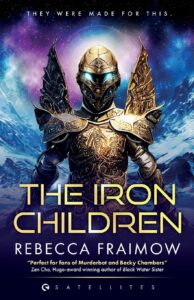
The Iron Children
by Rebecca Fraimow
Genres: Fantasy, Science FictionPages: 159
Rating:

Synopsis:Asher has been training her entire life to become a Sor-Commander. One day she’ll give her soul to the gilded, mechanical body and fully ascend. She’ll be a master of the Celesti faith, and the commander to a whole battalion of Dedicates. These soldiers, human bodies encased in exoskeletons, with extra arms, and telepathic subordination to the Sor-Commanders, are the only thing that’s kept the much larger Levastani army of conquest at bay for decades.
But while on a training journey, Asher and her party are attacked, and her commander is incapacitated, leaving her alone to lead the unit across a bitterly cold, unstable mountain.
It should be fine. She has the terrain memorised, and Sergeant Barghest is exceptional at their job. But one of the Dedicates is not what they seem: a spy for the enemy, with their own reasons to hate their mechanical body and the people who put them in it.
To get off the mountain alive, Asher and her unit will need to decide how much they’re willing to sacrifice—and what for.
Rebecca Fraimow’s The Iron Children packs a lot into quite a small space. The basics are easy: there are two nations at war, and one of the tools used by one side against the other is the ability to turn people (Dedicates) into mechs, who are deployed under a fully mechanical commander who can take control of their bodies when needed (or wanted).
We get just a glimpse of how things are supposed to work, before things go south and Asher — a young training officer, still human for now — has to take charge of the situation. It’s all pretty claustrophobic as we follow the unit through an avalanche and into a cave system, and we know that one member of the group is a traitor. It’s not immediately obvious who, because their sections are written in first person. The switching between first and third is a little odd sometimes, but it makes sense for telling this particular story.
There’s a heck of a lot of potential to the world, but mostly the story stays focused on this particular group and the frictions between them, which helps it feel very immediate and urgent. Like I said, claustrophobic, as well.
The ending feels slightly unsatisfactory; it’s not clear to me exactly what Asher intends to do, or how she and Barghest are going to conceal the fallout of what happened — if they are. Won’t people work it out quickly? I don’t always need my stories wrapped up in a tidy bow, but I could’ve used a little more here at the end. Otherwise, though, I found this one pretty compelling.
Rating: 4/5
